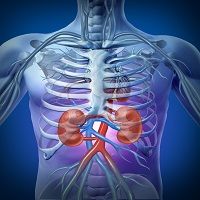Article
New Device Reduces Contrast-Induced Kidney Injuries
Author(s):
RenalGuard Solutions officials are claiming success in the REMEDIAL III trial for a new product that creates high urine output to prevent kidney injuries during interventional procedures.

A new device creating high urine output and fluid balancing could help prevent contrast-induced acute kidney injuries (CI-AKI).
During the TCT 2019 meeting in San Francisco, a team led by Carlo Briguori, MD, PhD, chief of the Laboratory of Interventional Cardiology at Clinica Mediterranea, announced the results of a late-breaking clinical trial showing the RenalGuard Therapy was beneficial in reducing CI-AKI for patients with kidney disease who undergo interventional procedures.
RenalGuard Solutions announced the positive results from the 700-patient, randomized, investigator-driven Renal Insufficiency After Contrast Media Administration Trial III (REMEDIAL III) using the device to protect patients from common kidney injuries that occur when contrast is used in interventional procedures by inducing and maintaining high urine output.
Contrast can cause a number of injuries to the kidneys, including direct toxicity, blocking oxygen delivery to the kidney, and increasing fluid loss.
The device works by measuring a patient’s urine output to automatically adjust hydration on an individual basis to induce high urine rates, which have been proven to protect the kidney from a range of injuries.
RenalGuard Therapy has been used with more than 23,000 patients through a number of clinical trials. Contrast-induced acute kidney injuries account for approximately 10% of all causes of hospital-acquired renal failure and increases in hospital length.
The REMEDIAL III trial was designed to evaluate the ability of the 2 most successful patient "tailored hydration regimens" to protect at-risk patients from CI-AKI by comparing RenalGuard Therapy with left ventricular end-diastolic pressure (LVEDP)-guided hydration.
The clinical data showed the new therapy was more beneficial than LVEDP-guided hydration for preventing these injuries. The data showed significantly lower incidences of CI-AKI and/or pulmonary edema, as well as a lower incidence of major adverse events a month following treatment.
The trial met the primary endpoint of the onset of CI-AKI defined by the rise in serum creatinine less than 25% of .5 mg/dl and/or pulmonary edema.
In the phase III study, 36 out of 351 patients treated with LVEDP-guided hydration developed a kidney injury and/or pulmonary edema. On the other hand, only 20 out of 351 patients treated with the RenalGuard Therapy developed a CI-AKI and/or pulmonary edema.
The investigators also found 44 of the patients in the LVEDP group suffered major adverse events 1 month after treatment, including dialysis, sustained kidney damage, acute pulmonary edema, and death. This was significantly higher than the 21 patients who suffered these events in the RenalGuard Therapy group.
“RenalGuard Therapy has once again been proven to be the most effective means of preventing acute kidney injury in at risk patients,” Howard Levin, MD, RenalGuard Solutions Chief Medical Officer, said in a statement.
“In comparing RenalGuard to the POSEIDON protocol, Dr. Briguori selected the most aggressive comparison possible,” he added. “His finding that RenalGuard provided superior CI-AKI protection provides the strongest evidence to date to support the use of RenalGuard Therapy in at-risk patients.”


